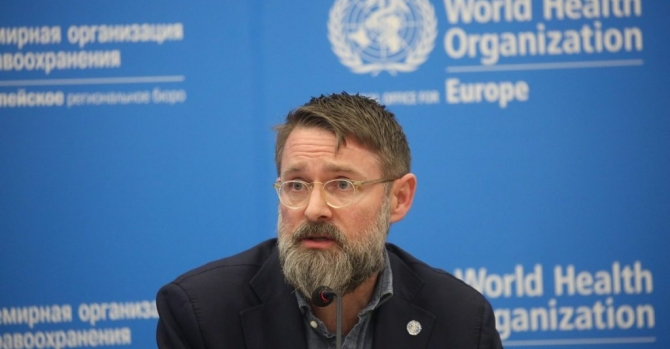Get Ready For The Worst, WHO Advises Belarus On Fight Against COVID-19
Belarusfeed
13 April 2020, 22:39
 Belarus should prepare for the worst-case scenarios and take new measures to physically distance people. Dr. Patrick O’Connor of the WHO’s Regional Office for Europe who led the WHO mission in Belarus, said at a press conference on 11 April.
Belarus should prepare for the worst-case scenarios and take new measures to physically distance people. Dr. Patrick O’Connor of the WHO’s Regional Office for Europe who led the WHO mission in Belarus, said at a press conference on 11 April.
The WHO mission arrived in Belarus at the invitation of our authorities to evaluate the country’s response to COVID-19 and approaches of providing medical care. During their trip the WHO experts inspected healthcare facilities of Minsk, Minsk Oblast and Vitebsk Oblast.
According to Dr. Patrick O’Connor, Belarus is entering a new phase in the evolution of the outbreak, since the virus has started spreading through communities. Physical distancing, proper testing, isolation of people who were in contact with coronavirus patients and other community-wide measures are needed.
The expert stressed that physical distancing is not about self-isolation, it means abandoning sports and cultural events, distance learning and reducing the movement for high-risk groups, such as the elderly and people with chronic diseases.
"It’s time to get ready for the worst-case scenarios, it’s a long run,” Dr. Patrick O’Connor explained."
Recently, the Ministry of Health has ceased to inform the population about the number of infected in the regions. Healthcare Minister Vladimir Karanik explained that the agency did this because the media tried to find the infected patients, give their contacts, place of work, as a result, people were afraid of publicity.
The situation with media is changing, the minister noted, therefore, the agency will consider the possibility of giving the statistics of cases in the regions, so that people start being more careful and follow the recommendations of specialists – follow hygiene rules and limit social contacts.
When asked whether Belarus should cancel a military parade on 9 May, since the peak of the disease is expected at the end of April-early May, the head of the WHO mission did not give a specific answer. Among the positive aspects, the organisation noted the systematic approach in epidemiological monitoring in Belarus.
It also commended the availability of laboratories for carrying out tests, separation of patients in polyclinics and hospitals to prevent transmission of the virus, as well as the rapid production of protective equipment for healthcare workers within the country, as supplies in the global market are reduced.
13 April 2020, 22:39

Dr. Patrick O’Connor of the WHO’s Regional Office for Europe
The WHO mission arrived in Belarus at the invitation of our authorities to evaluate the country’s response to COVID-19 and approaches of providing medical care. During their trip the WHO experts inspected healthcare facilities of Minsk, Minsk Oblast and Vitebsk Oblast.
According to Dr. Patrick O’Connor, Belarus is entering a new phase in the evolution of the outbreak, since the virus has started spreading through communities. Physical distancing, proper testing, isolation of people who were in contact with coronavirus patients and other community-wide measures are needed.
The expert stressed that physical distancing is not about self-isolation, it means abandoning sports and cultural events, distance learning and reducing the movement for high-risk groups, such as the elderly and people with chronic diseases.
"It’s time to get ready for the worst-case scenarios, it’s a long run,” Dr. Patrick O’Connor explained."
Recently, the Ministry of Health has ceased to inform the population about the number of infected in the regions. Healthcare Minister Vladimir Karanik explained that the agency did this because the media tried to find the infected patients, give their contacts, place of work, as a result, people were afraid of publicity.
The situation with media is changing, the minister noted, therefore, the agency will consider the possibility of giving the statistics of cases in the regions, so that people start being more careful and follow the recommendations of specialists – follow hygiene rules and limit social contacts.
When asked whether Belarus should cancel a military parade on 9 May, since the peak of the disease is expected at the end of April-early May, the head of the WHO mission did not give a specific answer. Among the positive aspects, the organisation noted the systematic approach in epidemiological monitoring in Belarus.
It also commended the availability of laboratories for carrying out tests, separation of patients in polyclinics and hospitals to prevent transmission of the virus, as well as the rapid production of protective equipment for healthcare workers within the country, as supplies in the global market are reduced.

